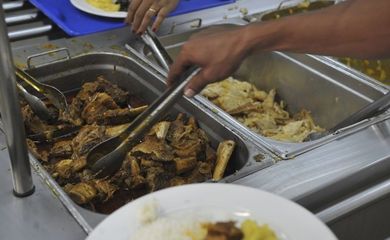UN wants to cut food wastage in Brazil


Brazil is regarded as one of the world's ten biggest food wasters, with nearly 30% of its output almost completely discarded after the harvest.

The Food and Agriculture Organization of the United Nations (FAO) is considering the creation of a network aimed at curbing wastage in Brazil's food production chain. The country is regarded as one of the world's ten biggest food wasters, with nearly 30% of its output almost completely discarded after the harvest.
The reduction in food loss will be the subject of several debates at a workshop to be held by a specialized unit of the Brazilian Agricultural Research Corporation (Embrapa) on Thursday (Apr 30) in Rio de Janeiro. The event comes as a contribution to the 5th National Food and Nutritional Security Conference, to take place in Brasília in November this year.
FAO's goal in Latin America and the Caribbean is to set up a network of organizations, including NGOs, universities, and research institutes aimed at minimizing production and post-harvest losses. As is already the case in the US, it would be the government's duty to make improvements in infrastructure for the transportation of food.

Agricultural products are wasted either because they are past their expiration date or because they have been identified as malformed or not in compliance with the standards set by the Ministry of Agriculture
“What should be done in Brazil is the creation of a network of organizations capable of tackling this issue in cooperation with the government, private companies, and NGOs. The Brazilian government would contribute with the appropriate legislation, infrastructure, and storage,” explained agronomist Murilo Freire, researcher at Embrapa.
A member of FAO's Committee of Specialists in Loss and Wastage Reduction for Latin America and the Caribbean, the expert said that the problem is found throughout the country's production chain, which lacks in infrastructure, handling, packaging, transportation, and storage—not to mention problems like inappropriate planting and diseases.
According to Freire, agricultural products are wasted either because they are past their expiration date or because they have been identified as malformed or not in compliance with the standards set by the Ministry of Agriculture. The committee's goal is to set up a network aimed at reducing wastage in the food production.
“Wastage happens when the food produced is thrown away. In other words, it doesn't get to the people who need it,” the researcher said. As an example, he mentions ugly fruit, which neither meets the standards nor have high market potential, but has the same proteins, vitamins and minerals found in a regular specimen.
Food losses in Brazil account for an average of 30% of post-harvest fruit, and 35% of vegetables. “Developed countries waste more than developing countries do. In the former, losses are found more often towards the end.”
FAO understands that the world population has a low level of food security, since a third of its total output is loss—nearly 1.7 billion tons of food. In Africa, losses add up to as much as 60%. “It's 50% in the production phase alone, and another 5% in distribution, and 5% among consumers,” Freire said. In Germany, however, wastage has been reduced to a minimum.
Furthermore, Brazil's current legislation penalizes food donors. Industrialists, producers, or even restaurants are not allowed to give away food because, if someone feels sick, the donor may be held accountable. “This happens here in Brazil, not in other countries.” Freire reported. A law under deliberation in Congress since 1998—the so-called Good Samaritan Law—is an attempt to change that. The piece of legislation has been ratified by the Senate, but is still pending approval at the lower house.
Also, “the storage for grains and vegetables in Brazil is not appropriate,” Freire argued.
Another issue mentioned is packaging. “If everything that's wasted was used, producers would make more money and consumers would pay less,” the specialist noted.
Translated by Fabrício Ferreira
Fonte: UN wants to cut food wastage in Brazil


